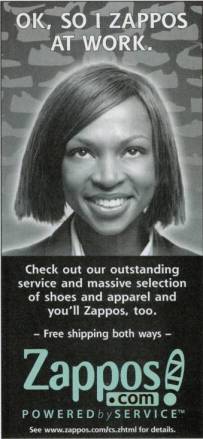Do You ZAPPOS at Work? Online Retailer Encourages Improper Trademark Use
At a time when many companies plead with the public to make proper use of their trademarks, it’s almost shocking to see one company encourage the public to do just the opposite — to use its trademark as a verb instead of as an adjective.
Here’s what Zappos.com is telling potential customers: “Ok, so I Zappos at work. Check out our outstanding service and massive selection of shoes and apparel and you’ll Zappos too.”

Contrast that message with what Tivo Inc. tells its customers:
“The TiVo logo and trademarks are some of our most valuable assets and it is essential that they be used correctly in writing and are protected or they will be lost.
“A trademark is lost when it becomes generic, i.e. when it has come to mean the product as distinguished from a certain brand of the product. If our trademarks become generic, they could be used by competitors to describe their goods or services. Consider the following now-generic nouns that were once trademarks: Escalator, Linoleum, Kerosene, Lonolin, Cellophane, Thermos, Aspirin, Yo Yo and Bikini. The importance of correct trademark use cannot be emphasized enough.”
Tivo goes on to warn: “Trademarks are always proper adjectives. They should never be used as a verb.
Example:
Correct: I want to record ‘Desperate Housewives’ on the TiVo® DVR.
Incorrect: I want to TiVo ‘Desperate Housewives.’”
As Tivo’s efforts correctly suggest, Zappos.com’s ad campaign is fatally flawed. If it succeeds and convinces consumers to associate ZAPPOS with buying shoes online in general — rather than the online shoe seller Zappos.com in particular — the company will lose its rights in the very trademark it is trying to promote. Even worse, campaigns like this hamper the efforts of other trademark owners who spend advertising dollars encouraging proper trademark use. Consumers are left with the mixed message that it’s ok to “zappos” but not ok to “tivo.” That hurts all trademark owners.
So is Zappos.com ignorant of trademark law? Or is it knowingly seeking a short-term benefit at the expense of others?
References (1)
-
 Response: online business opportunityMy Power Mall It is totally new, totally FREE, very simple, and can be done in conjunction with anything else you are doing to generate financial freedom. You could easily be making $4 - 6000 a month, but your income potential is unlimited. Interested? It will only take a few minutes ...
Response: online business opportunityMy Power Mall It is totally new, totally FREE, very simple, and can be done in conjunction with anything else you are doing to generate financial freedom. You could easily be making $4 - 6000 a month, but your income potential is unlimited. Interested? It will only take a few minutes ...
Reader Comments (5)
As long as ZAPPOS refers to that particular website, maybe it's not so bad. Check out the GOOGLE case here: http://tinyurl.com/27h4jh
and the cases cited therein.
It's one thing if ZAPPOS refers to all discount shopping, but quite another if ZAPPOS refers to a particular shopping site.
Is Yahoo!, like Zappos, "ignorant of trademark law," in your view? Or did its marketing and legal department jointly decide that the benefit of injecting the brand into daily conversation was worth the marginal risk that consumers might come to use the "Yahoo" name to describe services not associated with the Yahoo company?
Trying to clamp down on this is a sign of weak brand flailing for market relevance.